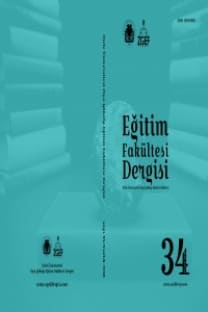İLKÖĞRETİM ÖĞRENCİLERİNİN DİNLEME TEMELLİ TEST PERFORMANSLARI İLE OKUMA TEMELLİ TEST PERFORMANSLARININ KARŞILAŞTIRILMASI
Bu çalışmanın amacı ilköğretim öğrencilerinin dinleme becerilerini incelemektir. Çalışmanın katılımcılarını 19 altıncı sınıf öğrencisi oluşturmaktadır. Veriler, farklı iki formda (Dinleme Temelli Test ve Okuma Temelli Test) hazırlanmış, 10 sorudan oluşan bir test aracılığıyla toplanmıştır. Dinleme temelli test, soruların ses kayıtlarından ve cevap kâğıdından oluşmaktadır. Çalışmada öğrencilerin okuma temelli test performansları ile dinleme temelli test performansları karşılaştırılmış ve okuma temelli test puanlarının dinleme temelli test puanlarından çok daha yüksek olduğu görülmüştür. Test puanları arasındaki mevcut farkı derinlemesine incelemek amacıyla 3 öğrencinin bazı sorulara her iki testte verdiği cevaplar karşılaştırılmıştır. Bu karşılaştırmada, öğrencilerin okuma temelli testte cevapladığı bir soruyu dinleme temelli testte cevaplayamadığı görülmüştür.
Anahtar Kelimeler:
Dinleme Temelli Test, Matematik Eğitimi, İletişim Becerileri
COMPARING STUDENTS’ WRITTEN TEST PERFORMANCE WITH LISTENING TEST PERFORMANCE
The present study aimed to assess the listening skills of elementary students in a mathematics classroom and to examine if and how students’ performance in listening tasks and writing tasks vary. The participants of the study were 19 sixth grade students. Data was collected through a ten-item test, which was designed in two different forms: Written Test and Listening Test. Students’ written responses to both tests were analyzed by a scoring guide. Results revealed that students had relatively high scores in written test compared to listening test. To analyze this difference in depth, three students’ responses to the same items in both tests were compared. This comparison showed that students who gave correct response to a question in written test could not answer the same question in listening test. Listening requires students to understand and evaluate every spoken message and to follow this with the appropriate action. However, the present study showed that students’ listening skills should be improved through various listening activities.
Keywords:
Listening Test, Mathematics Education, Communication Skills,
___
- Berberoğlu, G. (2011). Okullarda ölçme ve değerlendirme ne amaçla yapılmalıdır? Cito Eğitim: Kuram ve Uygulama, 11(1), 10-24.
- Burrows, L. K., Guthrie, D., Peterson, D., & Rakow-Larson, L. (1999). “Improving listening skills in children.” Master’s Action Research Project, Saint Xavier University and IRI/skylight, Illinois. [Online] Retrieved on 13-May-2011 from ERIC database (ED435107).
- Ediger, M. (2002). “Listening Objectives in the Mathematics Curriculum.” [Online] Retrieved on 12-May-2011 from ERIC database (ED471189).
- Gilbert, M. B. (2001). Effective listening: The key to classroom attendance. [Online] Retrived on 13-May-2011, at URL: http://www.nade.net/documents/SCP97/SCP97.9.pdf
- Fowler, K. (2005). Hear the message Mind Tools on Active Listening. [Online] Retrieved on 12-May-2011, at URL: www.mindtools.com
- Harryman, E. Kresheck, J. & Nicolosi, L. (1996). Terminology of communucation disorders. Williams & Wilkins, Pennsylvania.
- Hiebert, J., Carpenter, T., Fennema, E., Fuson, K., Wearne, D., Murray, H., Olivier, A., Human, P., (1997). Making Sense: Teaching and learning mathematics with understanding, Heinemann, Portsmouht, NH
- İş Güzel, Ç., Kızıltan, A., Gökçe, S. (2010). Matematik dersinde üst düzey düşünme becerilerinin geliştirilmesi, Cito Eğitim: Kuram ve Uygulama, 10(4), 16-29.
- Kolstad, R. Briggs, L. D. & Whalen, K. (1996). Incorporating language arts into the mathematics curriculum: A literature survey. Education, Vol. 116.
- Medway Council (no date). Speaking, listening and learning-Mathematics supplement. [Online] Retrived on 13-May-2011, at URL: http://www.medway.gov.uk/
- Mead, N. A. & Rubin, D. L. (1985). “Assessing Listening and Speaking Skills.” [Online] Retrieved on 15-May-2011 from ERIC database (ED263626).
- Milli Eğitim Bakanlığı Talim ve Terbiye Kurulu Başkanlığı (2008). İlköğretim Matematik Dersi Öğretim Programı ve Kılavuzu (6-8. Sınıflar), Ankara.
- National Council of Teachers of Mathematics (1989). Curriculum and evaluation standards for school mathematics. Reston: Author.
- National Council of Teachers of Mathematics. (2000). Principles and standards for school mathematics. Reston, VA: Author.
- Ringler, M. C. & Bossé, M. J. (2008). “Learning mathematics as a second language: Implications for instructional leaders.” Paper presented at the UCEA Annual Convention, Orlando, FL.
- Wallace, T. Stariha, W. E. & Walberg, H. J. (2004). Teaching, speaking, listening and writing. Educational Practices Series-14, International Academy of Education. [Online] Retrieved on 17-May-2011, at URL: http://www.ibe.unesco.org/International/Publications/pubhome.htm
- ISSN: 1305-0060
- Yayın Aralığı: Yılda 2 Sayı
- Başlangıç: 1995
- Yayıncı: Dicle Üniversitesi
Sayıdaki Diğer Makaleler
Mehmet TAYFUR, Osman Ferda BEYTEKİN, Münevver YALÇINKAYA
ÖĞRETMEN ADAYLARININ STRES DÜZEYLERİNİN ÇEŞİTLİ DEĞİŞKENLER AÇISINDAN ANALİZİ
MİKRO-ÖĞRETİM UYGULAMASININ ÖĞRETMEN ADAYLARI GÖZÜYLE DEĞERLENDİRİLMESİ
COĞRAFİ BİLGİ SİSTEMİ KAVRAMINA METAFORİK BAKIŞ
SINIF ÖĞRETMENİ ADAYLARININ DERS ARAŞTIRMASI HAKKINDAKİ GÖRÜŞLERİ
LİSE DİSİPLİN SORUNLARININ CİNSİYET DEĞİŞKENİ AÇISINDAN İNCELENMESİ
Hasan AYDIN, Fadime Koc DAMGACI
SINIF ÖĞRETMENLERİNİN ALTERNATİF ÖLÇME VE DEĞERLENDİRME BİLGİ DÜZEYLERİNİN BELİRLENMESİ
